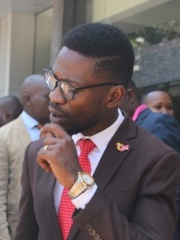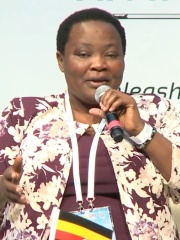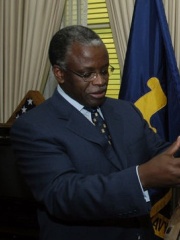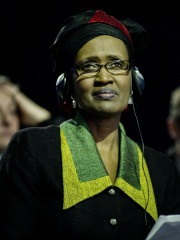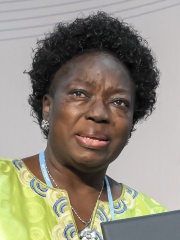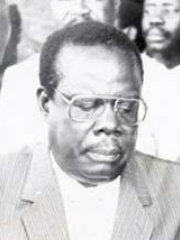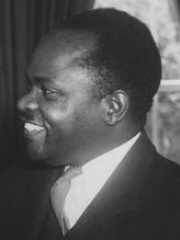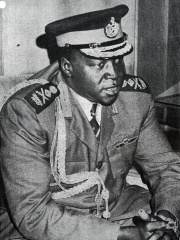
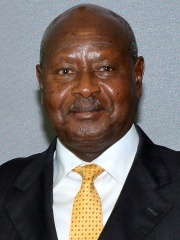
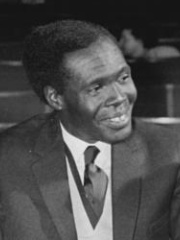
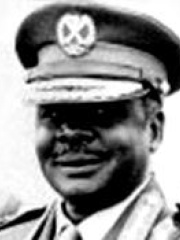
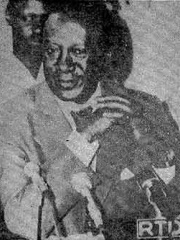
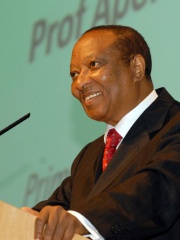
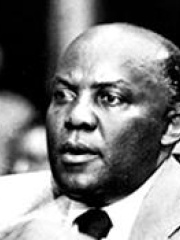
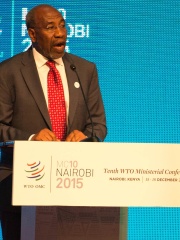
The Most Famous
POLITICIANS from Uganda
This page contains a list of the greatest Ugandan Politicians. The pantheon dataset contains 19,576 Politicians, 18 of which were born in Uganda. This makes Uganda the birth place of the 118th most number of Politicians behind Rwanda, and Senegal.
Top 10
The following people are considered by Pantheon to be the top 10 most legendary Ugandan Politicians of all time. This list of famous Ugandan Politicians is sorted by HPI (Historical Popularity Index), a metric that aggregates information on a biography's online popularity. Visit the rankings page to view the entire list of Ugandan Politicians.

1. Idi Amin (1923 - 2003)
With an HPI of 78.16, Idi Amin is the most famous Ugandan Politician. His biography has been translated into 97 different languages on wikipedia.
Idi Amin Dada Oumee (30 May 1928 – 16 August 2003) was a Ugandan military officer and politician who served as the third president of Uganda from 1971 until his overthrow in 1979. An admirer of Adolf Hitler, he ruled as a military dictator and is considered one of the most brutal despots in modern world history. He is often called "the Hitler of Africa" and his ideology bears similarities to National Socialism. Amin was born in the British Protectorate of Uganda, into a Muslim family to a Kakwa father and a Lugbara mother. In 1946, he joined the King's African Rifles, part of the British Colonial Army, as a cook. He rose to the rank of lieutenant, taking part in British actions against Somali rebels and then the Mau Mau Uprising in Kenya. Uganda gained independence from the United Kingdom in 1962, and Amin remained in the army, rising to the position of deputy army commander in 1964 and being appointed commander two years later. He became aware that Ugandan president Milton Obote was planning to arrest him for misappropriating army funds, so he launched the 1971 Ugandan coup d'état and declared himself president. During his years in power, Amin shifted from being a pro-Western ruler enjoying considerable support from Israel to being backed by Libya's Muammar Gaddafi, Zaire's Mobutu Sese Seko, the Soviet Union, and East Germany. In 1972, Amin expelled Asians, a majority of whom were Indian-Ugandans, leading India to sever diplomatic relations with his regime. In 1975, Amin assumed chairmanship of the Organisation of African Unity, an intergovernmental organization designed to promote solidarity among African states (an annually rotating role). Uganda was a member of the United Nations Commission on Human Rights from 1977 to 1979. The United Kingdom broke diplomatic relations with Uganda in 1977, and Amin declared that he had defeated the British and added "CBE" to his title, for "Conqueror of the British Empire". As Amin's rule progressed into the late 1970s, there was increased unrest in Uganda, prompted on the one hand by his persecution of political dissidents and certain ethnic groups and on the other by the country's very poor international standing, a result of Amin's support for the 1976 hijacking that led to Israel's Operation Entebbe. He then attempted to annex Tanzania's Kagera Region in 1978. Tanzanian president Julius Nyerere ordered his troops to invade Uganda in response. Tanzanian Army and rebel forces successfully captured Kampala in 1979 and ousted Amin from power. Amin went into exile, first in Libya, then Iraq, and finally in Saudi Arabia, where he lived until his death in 2003. Amin's rule was characterized by rampant human rights abuses including political repression and extrajudicial killings as well as nepotism, corruption, and gross economic mismanagement. International observers and human rights groups estimate that between 100,000 and 500,000 people were killed under his regime. His brutality and atrocities towards Ugandans has given him the nickname, "The Butcher of Uganda".

2. Yoweri Museveni (b. 1944)
With an HPI of 71.94, Yoweri Museveni is the 2nd most famous Ugandan Politician. His biography has been translated into 82 different languages.
Yoweri Kaguta Museveni Tibuhaburwa (born 15 September 1944) is a Ugandan politician, dictator and former military officer who has served as the ninth president of Uganda since 1986. Born in Ntungamo, Uganda (then under British control), Museveni studied political science from the University of Dar es Salaam where he initiated the University Students' African Revolutionary Front. In 1972, he participated in the abortive invasion of Uganda against the regime of President Idi Amin. The next year, Museveni established the Front for National Salvation and fought alongside Tanzanian forces in the Tanzania–Uganda War, which overthrew Amin. Museveni contested the subsequent 1980 general election on the platform of Uganda Patriotic Movement, though claimed electoral fraud after losing to the unpopular Milton Obote. Museveni unified the opposition under the National Resistance Movement and started the Ugandan Bush War. On January 30, 1986, after the decisive Battle of Kampala, Museveni was sworn as president. As president, Museveni suppressed the Ugandan insurgency and oversaw involvement in the Rwandan Civil War and the First Congo War. He ordered an intervention against the Lord's Resistance Army in an effort to halt their insurgency. His rule has been described by scholars as competitive authoritarianism, or illiberal democracy. The press has been under the authority of government. His presidency has been characterized by relative economic success and, in its later period, an upsurge in activity that is in opposition in homosexuality alongside numerous constitutional amendments, like the scrapping of presidential term limits in 2005 and age limits in 2017. On 16 January 2021, Museveni was reelected to a sixth term with 58.6% of the vote, despite many videos and reports showing ballot box stuffing, over 400 polling stations with 100% voter turnout and human rights violations. As of 2025, after 39 years of his authoritarian rule, Uganda has been ranked 163rd in GDP (nominal) per capita and 157th by Human Development Index.

3. Milton Obote (1925 - 2005)
With an HPI of 69.94, Milton Obote is the 3rd most famous Ugandan Politician. His biography has been translated into 62 different languages.
Apollo Milton Obote (28 December 1925 – 10 October 2005) was a Ugandan politician who served as the second Prime Minister of Uganda from 1962 to 1966 and the second president of Uganda from 1966 to 1971 and later from 1980 to 1985. A Lango, Obote studied at the Busoga College and Makerere University. In 1956, he joined the Uganda National Congress (UNC) and later split away by founding the Uganda People's Congress (UPC) in 1960. After Uganda gained independence from British colonial rule in 1962, Obote was sworn in as prime minister in a coalition with the Kabaka Yekka, whose leader Mutesa II was named president. Due to a rift with Mutesa over the 1964 Ugandan lost counties referendum and later getting implicated in a gold smuggling scandal, Obote overthrew him in 1966 and declared himself president, establishing a dictatorial regime with the UPC as the sole official party in 1969. As president, Obote implemented ostensibly socialist policies, under which the country suffered from severe corruption and food shortages. He was overthrown in a military coup d'état by Idi Amin in 1971, settling in exile in Tanzania, but was re-elected in an election reported to be neither free nor fair in 1980, a year after Amin's 1979 overthrow. His second period of rule ended after a long and bloody conflict known as the Ugandan Bush War during which he was overthrown a second time by another coup d'état in 1985 led by Tito Okello, prompting him to live the rest of his life in exile.

4. Tito Okello (1914 - 1996)
With an HPI of 60.73, Tito Okello is the 4th most famous Ugandan Politician. His biography has been translated into 28 different languages.
Tito Lutwa Okello (15 October 1914 – 3 June 1996) was a Ugandan military officer and politician who served as the eighth president of Uganda from 29 July 1985 until 26 January 1986.
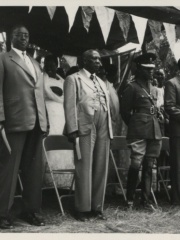
5. Mutesa II of Buganda (1924 - 1969)
With an HPI of 60.48, Mutesa II of Buganda is the 5th most famous Ugandan Politician. His biography has been translated into 31 different languages.
Sir Edward Frederick William David Walugembe Mutebi Luwangula Mutesa II (19 November 1924 – 21 November 1969) was a Ugandan royal and statesman who served as the first president of Uganda from 1962 to 1966, when he was overthrown by Milton Obote. Mutesa was also the Kabaka (King) of the traditional kingdom of Buganda in Uganda from 22 November 1939 until his death in 1969. He was often referred as King Freddie by the foreign press, a name rarely used in Uganda. Mutesa's defence of Bagandan interests and traditional autonomy led to conflicts with his erstwhile political ally Milton Obote, who would eventually overthrow him. Mutesa was crowned Kabaka on his 18th birthday in 1942, three years after the death of his father Daudi Cwa II of Buganda during British colonial rule in Uganda. In 1953, he attempted to have Buganda secede to retain the kingdom's independence from a proposed British colonial federation in East Africa. He was deposed and exiled by British colonial governor Andrew Cohen, but was allowed to return to the country two years later in the wake of a popular backlash known as the Kabaka Crisis under the terms of the 1955 Buganda Agreement. In the years preceding Uganda's independence from the United Kingdom in 1962, Mutesa became part of the monarchist Kabaka Yekka party which then formed a coalition with Milton Obote's Uganda People's Congress. The year after Uganda's independence, Mutesa was named the first President of Uganda (then a non-executive position) in 1963 with Obote as Prime Minister. Mutesa's alliance with Obote collapsed in 1964 over the Ugandan lost counties referendum. It worsened in 1966, resulting in Obote overthrowing him and forcing him into exile in the United Kingdom, where he died three years later.

6. Yusuf Lule (1912 - 1985)
With an HPI of 58.52, Yusuf Lule is the 6th most famous Ugandan Politician. His biography has been translated into 24 different languages.
Yusuf Kironde Lule (10 April 1912 – 21 January 1985) was a Ugandan professor and politician who served as the fourth president of Uganda between 13 April and 20 June 1979.

7. Apolo Nsibambi (1940 - 2019)
With an HPI of 57.44, Apolo Nsibambi is the 7th most famous Ugandan Politician. His biography has been translated into 27 different languages.
Apolo Robin Nsibambi (25 October 1940 – 28 May 2019) was a Ugandan academic and politician who served as the 8th Prime Minister of Uganda from 5 April 1999 until 24 May 2011, when Amama Mbabazi succeeded him. A distinguished scholar of political science, he taught at Makerere University from the 1960s and later held several senior academic positions, including Dean of the Faculty of Social Sciences and Head of the Department of Political Science. He was also Director of the Makerere Institute of Social Research between 1994 and 1996. Beyond academia, Nsibambi served in government as Minister of Public Service (1996–1998) and Minister of Education and Sports (1998–1999) before his appointment as Prime Minister. From 2003 to 2007, he became the first non-Head-of-State Chancellor of Makerere University. Widely regarded as an intellectual statesman, Nsibambi was noted for bridging academia and politics, and during his tenure as Prime Minister he described Makerere as an “intellectual cradle” for fellow scholar Ali Mazrui. He is remembered for his contributions to public service and higher education in Uganda.

8. Godfrey Binaisa (1920 - 2010)
With an HPI of 57.17, Godfrey Binaisa is the 8th most famous Ugandan Politician. His biography has been translated into 26 different languages.
Godfrey Lukongwa Binaisa QC (30 May 1920 – 5 August 2010) was a Ugandan lawyer and politician who served as the fifth president of Uganda from June 1979 to May 1980. Earlier, he was Attorney General of Uganda from 1962 to 1968. At the time of his death in 2010, he was Uganda's only surviving former president.

9. Ruhakana Rugunda (b. 1947)
With an HPI of 53.86, Ruhakana Rugunda is the 9th most famous Ugandan Politician. His biography has been translated into 22 different languages.
Ruhakana Rugunda (born 7 November 1947) is a Ugandan physician and politician who was Prime Minister of Uganda from 2014 to 2021. He held a long series of cabinet posts under President Yoweri Museveni beginning in 1986. He served as Uganda's Minister of Foreign Affairs from 1994 to 1996, and Minister of Internal Affairs from 2003 to 2009. Subsequently, he was Permanent Representative to the United Nations from 2009 to 2011 and Minister of Health from 2013 to 2014. He was appointed as Prime Minister on 18 September 2014 to 21 June 2021. He replaced Amama Mbabazi, who was dropped from the Cabinet.
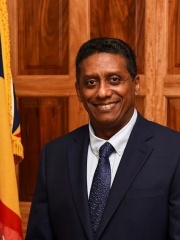
10. Danny Faure (b. 1962)
With an HPI of 53.48, Danny Faure is the 10th most famous Ugandan Politician. His biography has been translated into 34 different languages.
Danny Faure (born 8 May 1962) is a Seychellois politician who served as the fourth President of Seychelles from 16 October 2016 until 26 October 2020. Previously, he served as Vice-President of Seychelles from 2010 to 2016. Faure is a member of the United Seychelles Party (PP).
People
Pantheon has 18 people classified as Ugandan politicians born between 1912 and 1991. Of these 18, 9 (50.00%) of them are still alive today. The most famous living Ugandan politicians include Yoweri Museveni, Ruhakana Rugunda, and Danny Faure. The most famous deceased Ugandan politicians include Idi Amin, Milton Obote, and Tito Okello. As of April 2024, 1 new Ugandan politicians have been added to Pantheon including Zohran Mamdani.
Living Ugandan Politicians
Go to all RankingsYoweri Museveni
1944 - Present
HPI: 71.94
Ruhakana Rugunda
1947 - Present
HPI: 53.86
Danny Faure
1962 - Present
HPI: 53.48
Bobi Wine
1982 - Present
HPI: 52.48
Robinah Nabbanja
1969 - Present
HPI: 50.45
Amama Mbabazi
1949 - Present
HPI: 47.69
Winnie Byanyima
1959 - Present
HPI: 42.92
Rebecca Kadaga
1956 - Present
HPI: 39.98
Zohran Mamdani
1991 - Present
HPI: 12.60
Deceased Ugandan Politicians
Go to all RankingsIdi Amin
1923 - 2003
HPI: 78.16
Milton Obote
1925 - 2005
HPI: 69.94
Tito Okello
1914 - 1996
HPI: 60.73
Mutesa II of Buganda
1924 - 1969
HPI: 60.48
Yusuf Lule
1912 - 1985
HPI: 58.52
Apolo Nsibambi
1940 - 2019
HPI: 57.44
Godfrey Binaisa
1920 - 2010
HPI: 57.17
Paulo Muwanga
1924 - 1991
HPI: 51.66
Benedicto Kiwanuka
1922 - 1972
HPI: 44.62
Newly Added Ugandan Politicians (2025)
Go to all RankingsOverlapping Lives
Which Politicians were alive at the same time? This visualization shows the lifespans of the 8 most globally memorable Politicians since 1700.

